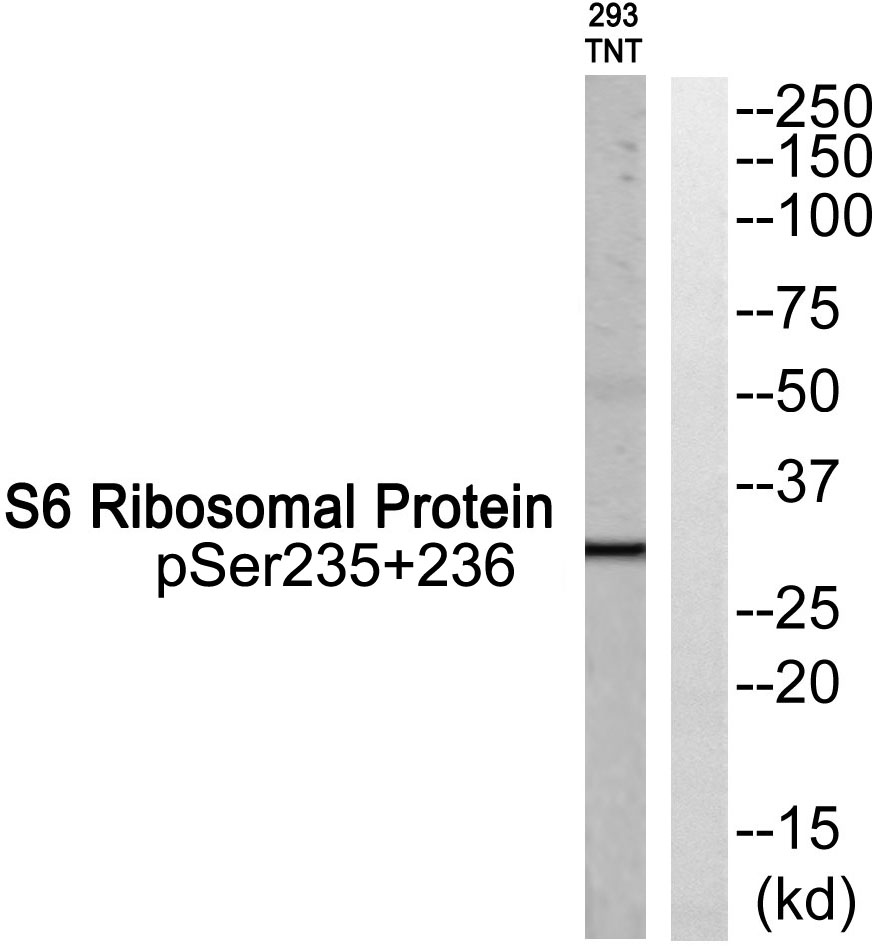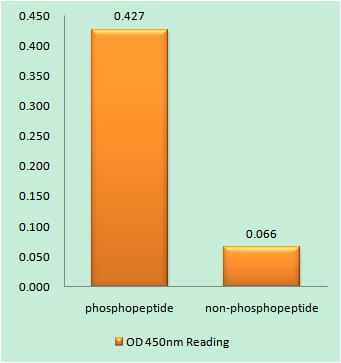Ribosomal Protein S6 (phospho Ser235/S236) Polyclonal Antibody
- 货号:YP0832
- 应用:WB;IHC;IF;ELISA
- 种属:Human;Mouse;Rat
- 靶点:
- Ribosomal Protein S6
- 简介:
- >>EGFR tyrosine kinase inhibitor resistance;>>Ribosome;>>HIF-1 signaling pathway;>>mTOR signaling pathway;>>PI3K-Akt signaling pathway;>>Apelin signaling pathway;>>Thermogenesis;>>Insulin signaling pathway;>>Coronavirus disease - COVID-19;>>Proteoglycans in cancer
- 基因名称:
- RPS6
- 蛋白名称:
- 40S ribosomal protein S6
- Human Gene Id:
- 6194
- Human Swiss Prot No:
- P62753
- Mouse Gene Id:
- 20104
- Mouse Swiss Prot No:
- P62754
- Rat Gene Id:
- 1.00911e+008
- Rat Swiss Prot No:
- P62755
- 免疫原:
- The antiserum was produced against synthesized peptide derived from human S6 Ribosomal Protein around the phosphorylation site of Ser235 and Ser236. AA range:200-249
- 特异性:
- Phospho-Ribosomal Protein S6 (S235/S236) Polyclonal Antibody detects endogenous levels of Ribosomal Protein S6 protein only when phosphorylated at S235/S236.
- 组成:
- Liquid in PBS containing 50% glycerol, 0.5% BSA and 0.02% sodium azide.
- 来源:
- Polyclonal, Rabbit,IgG
- 稀释:
- WB 1:500 - 1:2000. IHC 1:100 - 1:300. ELISA: 1:5000.. IF 1:50-200
- 纯化工艺:
- The antibody was affinity-purified from rabbit antiserum by affinity-chromatography using epitope-specific immunogen.
- 浓度:
- 1 mg/ml
- 储存:
- -15°C to -25°C/1 year(Do not lower than -25°C)
- 其他名称:
- RPS6;OK/SW-cl.2;40S ribosomal protein S6;Phosphoprotein NP33
- 实测条带:
- 30kD
- 背景:
- Ribosomes, the organelles that catalyze protein synthesis, consist of a small 40S subunit and a large 60S subunit. Together these subunits are composed of 4 RNA species and approximately 80 structurally distinct proteins. This gene encodes a cytoplasmic ribosomal protein that is a component of the 40S subunit. The protein belongs to the S6E family of ribosomal proteins. It is the major substrate of protein kinases in the ribosome, with subsets of five C-terminal serine residues phosphorylated by different protein kinases. Phosphorylation is induced by a wide range of stimuli, including growth factors, tumor-promoting agents, and mitogens. Dephosphorylation occurs at growth arrest. The protein may contribute to the control of cell growth and proliferation through the selective translation of particular classes of mRNA. As is typical for genes encoding ribosomal proteins, there are multiple processed
- 功能:
- function:May play an important role in controlling cell growth and proliferation through the selective translation of particular classes of mRNA.,PTM:Ribosomal protein S6 is the major substrate of protein kinases in eukaryote ribosomes. The phosphorylation is stimulated by growth factors, tumor promoting agents, and mitogens. It is dephosphorylated at growth arrest.,similarity:Belongs to the ribosomal protein S6e family.,
- 细胞定位:
- nucleus,nucleoplasm,nucleolus,cytoplasm,cytosol,ribosome,polysome,small ribosomal subunit,membrane,cytosolic small ribosomal subunit,dendrite,intracellular ribonucleoprotein complex,cytoplasmic ribonucleoprotein granu
- 组织表达:
- Brain,Colon,Colon adenocarcinoma,Epithelium,Muscle,Ovary,Pancreas,Placenta,Skin,Tes
HSP90 inhibitor AUY922 can reverse Fulvestrant induced feedback reaction in human breast cancer cells. CANCER SCIENCE 2017 May 19 WB Human MCF-7 cell,T47D cell
货号:YP0832
- June 19-2018
- WESTERN IMMUNOBLOTTING PROTOCOL
- June 19-2018
- IMMUNOHISTOCHEMISTRY-PARAFFIN PROTOCOL
- June 19-2018
- IMMUNOFLUORESCENCE PROTOCOL
- September 08-2020
- FLOW-CYTOMEYRT-PROTOCOL
- May 20-2022
- Cell-Based ELISA│解您多样本WB检测之困扰
- July 13-2018
- CELL-BASED-ELISA-PROTOCOL-FOR-ACETYL-PROTEIN
- July 13-2018
- CELL-BASED-ELISA-PROTOCOL-FOR-PHOSPHO-PROTEIN
- July 13-2018
- Antibody-FAQs
- 产品图片

- Western blot analysis of S6 Ribosomal Protein (Phospho-Ser235+Ser236) Antibody. The lane on the right is blocked with the S6 Ribosomal Protein (Phospho-Ser235+Ser236) peptide.

- Immunohistochemistry analysis of paraffin-embedded human breast cancer, using S6 Ribosomal Protein (Phospho-Ser235+Ser236) Antibody. The picture on the right is blocked with the S6 Ribosomal Protein (Phospho-Ser235+Ser236) peptide.

